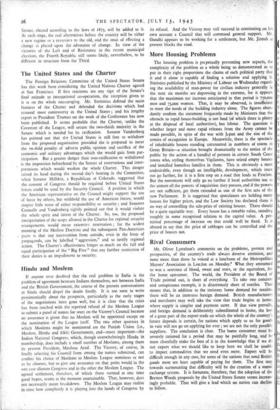More Housing Problems
The housing problem is perpetually presenting new aspects, the complexity of the problem as a whole being so demonstrated as to put in their right proportions the claims of each political party that it and it alone is capable of finding a solution and applying it. Statistics published by the Ministry of Labour on Wednesday regard- ing the availability of man-power for civilian industry generally in the next six months are depressing in the extreme, for it appears that the maximum net increase anticipated in that period is 750,000 men and 75,000 women. That, it may be observed, is insufficient to meet the needs of the building industry alone. The figures abun- dantly confirm the statement frequently made by Ministers that the obstacle to rapid house-building is not land (of which there is plenty at the disposal of local authorities), but labour. The question is whether larger and more rapid releases from the Army cannot be made possible, in spite of the war with Jepan and the size of the armies of occupation in Europe. Meanwhile, there is the spectacle of inhabitable houses standing untenanted in numbers of towns in Great Britain—a situation brought dramatically to the notice of the public by the action of a handful of persons in certain South Coast towns who, styling themselves Vigilantes, have seized empty houses and installed homeless families in them. This is obviously a most undesirable, even though an intelligible, development, which must not go further, for it is a first step on a road that leads to Fascism. But the movement will only go no further if local authorities use to the utmost all the powers of requisition they possess, and if the powers are not sufficient, get them extended as one of the first acts of the new Parliament. It is suggested that speculators are holding many houses for higher prices, and the Law Society has declared there is no way of controlling the sale-price of existing houses. There should be a quite equitable way. Every house has a rateable value, standing roughly in some recognised relation to the capital value. A per- mitted percentage of increase on that could well be fixed. It is absurd to say that the price of cabbages can be controlled and the price of houses not.
a.
a it b
fi p rl is It P: ta
G
13, h(
al th ar al


























 Previous page
Previous page